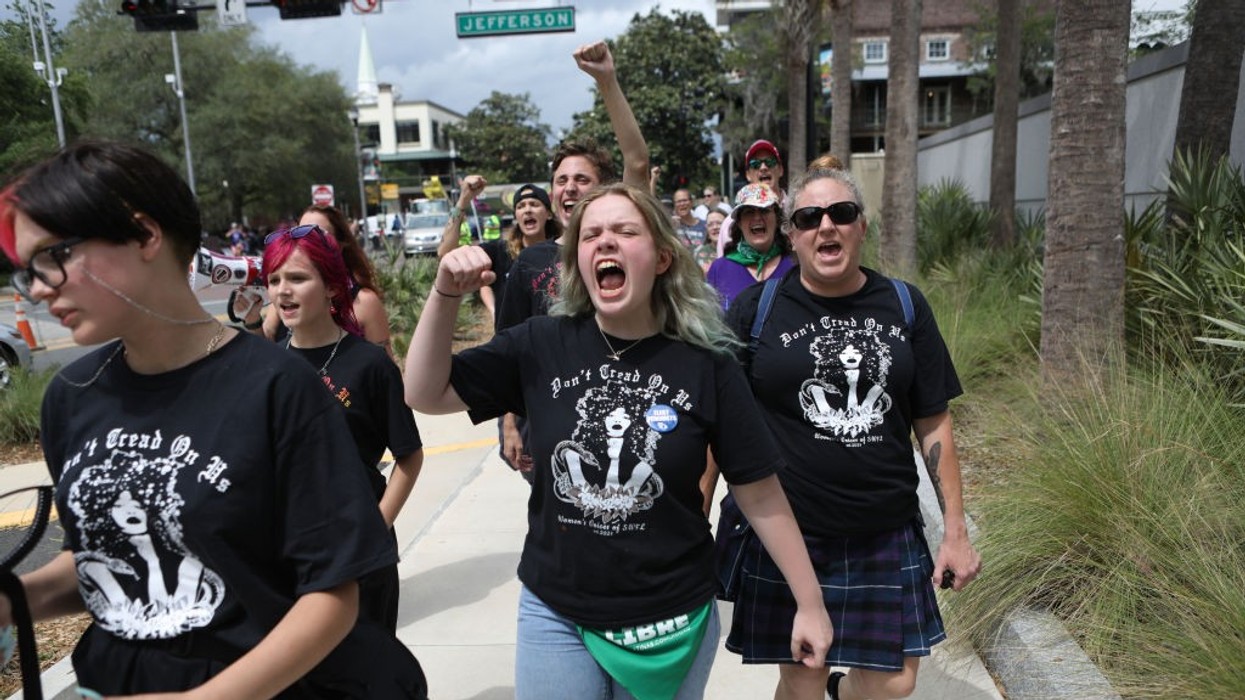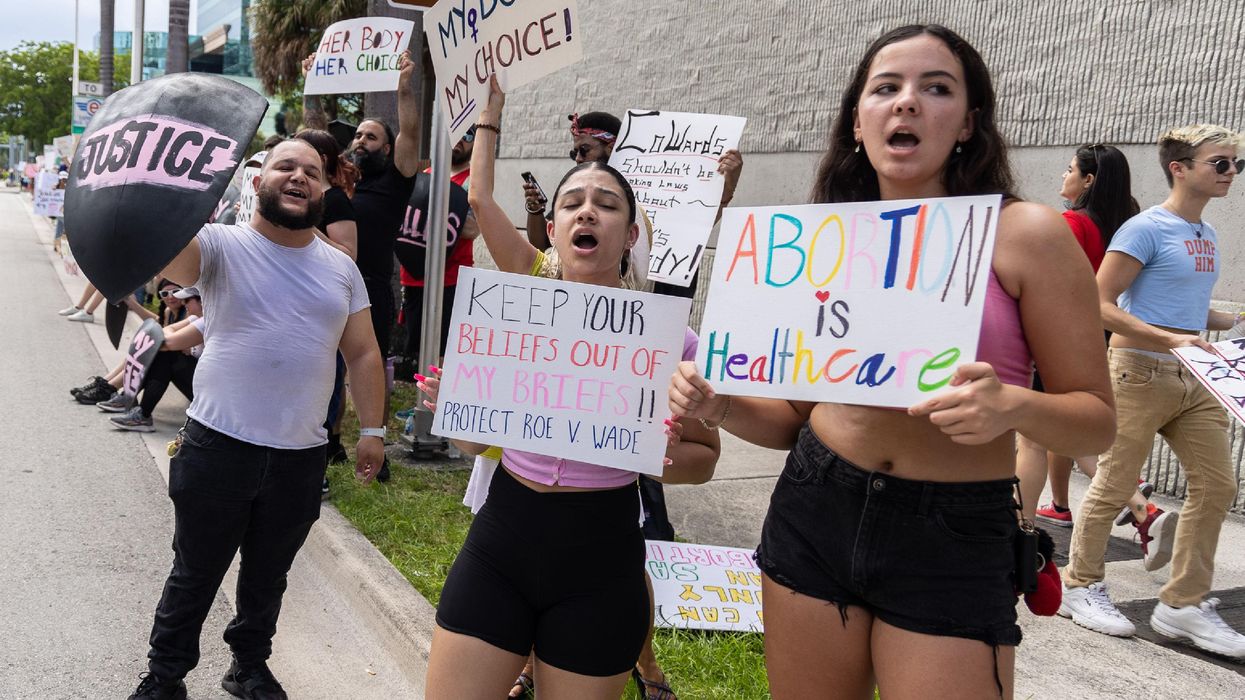Election Stakes Surge as Florida Supreme Court Puts Abortion on the Ballot
"Floridians will have the opportunity to reclaim their bodily autonomy and freedom from government interference!" said Florida Planned Parenthood Action.
The right-wing Florida Supreme Court on Monday effectively greenlighted a six-week abortion ban—but the justices also determined that state voters can weigh in on a ballot measure that would enshrine the right to abortion care in November.
Early last year, the court agreed to hear a challenge to the state's 15-week abortion ban—filed by the ACLU, the Center for Reproductive Rights, Planned Parenthood Federation of America, and others on behalf of healthcare providers. Just a few months later, the Florida Legislature passed and Republican Gov. Ron DeSantis signed the six-week ban. Because of the court's ruling, the stricter ban is now set to take effect in a month.
In response to the court's decisions on Monday,
Slate's Mark Joseph Stern noted that "the justices came mighty close to abolishing constitutional protections for abortion AND barring the citizenry from enacting new ones in one fell swoop."
Reproductive rights advocates pointed to the court's approval of the ban as proof of the need for Floridians to turn out in November for the abortion rights ballot measure, which requires 60% voter support to pass. It states:
No law shall prohibit, penalize, delay, or restrict abortion before viability or when necessary to protect the patient's health, as determined by the patient's healthcare provider. This amendment does not change the Legislature's constitutional authority to require notification to a parent or guardian before a minor has an abortion.
"Today the Florida Supreme Court ruled that Amendment 4 meets the requirements for this year's ballot," the Floridians Protecting Freedom campaign, which
spearheaded the fight for the measure, said on social media. "Floridians WILL get a chance to vote to reject government interference with abortion."
The campaign—organized by the ACLU of Florida, Florida Rising, Women's Voices of Southwest Florida, Florida Women's Freedom Coalition, SEIU 1199 Florida, and Planned Parenthood organizations in the state—also promoted its Rally to End the Six-Week Abortion Ban in Orlando planned for April 13.
Florida Planned Parenthood Action also celebrated the ballot decision, saying, "Floridians will have the opportunity to reclaim their bodily autonomy and freedom from government interference!"
Kelly Hall, executive director of the Fairness Project, called the state court's Amendment 4 decision "fantastic news for the movement to defend and expand reproductive rights using ballot measures," which has become an increasingly popular strategy since the U.S. Supreme Court reversed Roe v. Wade in 2022.
"The dedication Floridians Protecting Freedom has shown to fight for abortion rights is remarkable and inspiring, and the Fairness Project congratulates them on this victory," she continued, noting the campaign has gathered over 1 million signatures. "These dual rulings demonstrate why the initiative process is so important."
"Without citizen-initiated ballot measures, the cruel ban affirmed by the Florida Supreme Court today would go into effect with no recourse," Hall added. "Thankfully, voters will have the opportunity to decide in November whether healthcare decisions should be made by doctors and patients, or by politicians and judges."
The Center for Reproductive Rights pointed out that "EVERY SINGLE TIME that states have put abortion directly on the ballot, voters have chosen to protect it, and now, Florida voters will have the chance to do the same."
"A HUGE CONGRATULATIONS to all the reproductive rights advocates in Florida and across the country on this major victory," the center added. "This ballot measure could fundamentally reshape abortion access across the U.S. South and now, the power to make that happen is in the people's hands."
Before DeSantis signed the 15-week ban in 2022—just a couple of months before the Roe reversal, which amplified the efforts of right-wing state policymakers to cut off access to abortion—Florida was long "an oasis of reproductive care in the South."
Reproductive Freedom for All president and CEO Mini Timmaraju stressed Monday that "even as extremists like DeSantis try to impose their backward agenda, the people won't stop fighting for their rights."
Pro-choice Democrats in the state also chimed in. Florida Rep. Anna Eskamani (D-42), said that "the stakes for reproductive rights in Florida are incredibly high. Onward to November for a state where reproductive freedom is a reality for all."
Debbie Mucarsel-Powell, a former Democratic congresswoman now challenging U.S. Sen. Rick Scott (R-Fla.), highlighted her opponent's support for the six-week ban, which she warned would devastate reproductive care in the state.
"We HAVE to vote this November. We have the chance to protect our rights, and we have to vote like it," she said.In addition to the abortion rights amendment, the state Supreme Court ruled Monday that voters can decide on a measure that would let adults legally buy and consume marijuana—which Smart & Safe Florida called a "big win for liberty and cannabis advocates."
Congressman Maxwell Alejandro Frost (D-Fla.) declared: "There you have it Florida! Abortion rights and adult-use marijuana are going to be on the ballot this November. There's so much at stake, we can't stay home."


